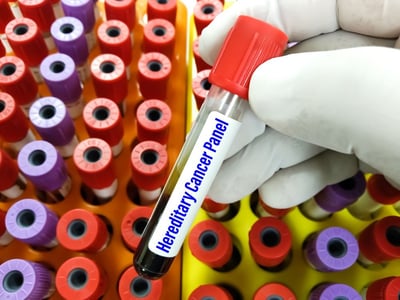All XRAYs



Relevance: High
Most relevant for: People interested in genetic testing.
Article: Genetic testing and the future of medicine
An article published in Katie Couric Media discusses genetic testing and how it can impact health. The author talked with Dr. Robert Steiner, a doctor who specializes in genetics. He talked about genetic testing and how the results can affect health and change lives. (Posted 9/28/23)
Este artículo está disponible en español.
READ MORE ›


Relevance: Medium-High
Most relevant for: Gay and bisexual men diagnosed with prostate cancer
Topic: Sexual health concerns of gay and bisexual men with prostate cancer
Prostate cancer therapy can affect gay and bisexual men differently than heterosexual men. Many urologists do not routinely address these unique concerns. Selecting providers who understand the concerns that are unique to gay and bisexual patients and asking questions about sexual health concerns may improve these patients' healthcare experiences. (Posted 9/21/23)
Este artículo está disponible en español.
READ MORE ›


Relevance: Medium-High
Most relevant for: People with metastatic castration resistant prostate cancer with a mutation in BRCA1 or BRCA2
Update: New drug combination for early treatment of some metastatic prostate cancer
The FDA approved Lynparza (olaparib) for use earlier in treatment of metastatic castration-resistant prostate cancer (mCRPC) when added to abiraterone and prednisone for people with a BRCA mutation found through genetic or tumor testing. Lynparza combined with hormone therapy may now be used as a first-line or later treatment. (Posted 9/11/23)
Este artículo está disponible en español.
READ MORE ›


Relevance: Medium-Low
Most relevant for: People with solid tumors.
Article: Promising drug for cancer treatment begins clinical trials
Researchers at City of Hope are testing a new type of cancer treatment drug. When tested in animals and cells taken from human cancers, this new drug prevented the growth of many types of cancer. Initial clinical trials in people have just started. (Posted 9/7/23)
Este artículo está disponible en español.
READ MORE ›


Relevance: Medium-High
Most relevant for: People with pancreatic cancer who have tumors that can be removed by surgery
Study: Personalized vaccines may help pancreatic cancer treatment
Pancreatic cancer is usually diagnosed at a late stage when patients have few treatment options. Early study results showed that a pancreatic cancer vaccine delayed the return of cancer for nearly half of the participants. (Posted 8/29/23)
Este artículo está disponible en español.
READ MORE ›


Relevance: Medium-High
Most relevant for: Young adults
Topic: Colorectal cancer is on the rise in young adults: What Millennials and Gen Zs need to know
The rate of colorectal cancer among young adults in the US has been increasing since the 1990s. Scientists are trying to figure out why. (Posted 8/15/23)
Este artículo está disponible en español.
READ MORE ›


Relevance: Medium-High
Most relevant for: People with breast cancer or metastatic breast cancer in sexual or intimate relationships and their partners
Topic: Sex and intimacy after breast cancer
A breast cancer diagnosis and treatment can affect relationships with romantic partners. This review highlights two studies that looked at how people with breast cancer and their partners are affected, how they cope, how best to communicate with each other and how to talk with healthcare providers about concerns related to cancer and sexuality. (Posted 8/8/23)
Este artículo está disponible en español.
READ MORE ›


Relevance: Medium-High
Most relevant for: People with advanced or recurrent endometrial cancer
Study: New treatment option for advanced or recurrent endometrial cancer
If you have advanced or recurrent endometrial cancer, there is a new treatment called Jemperli (dostarlimab) that could be an option for you. This study looked at how well Jemperli worked compared to standard treatment. Based on these results, the Food and Drug Administration (FDA) approved the combination of Jemperli and chemotherapy for certain types of advanced endometrial cancer. (Posted 8/4/23)
Este artículo está disponible en español.
READ MORE ›


Relevance: Medium-High
Most relevant for: People who are not at high risk of ovarian cancer who are having pelvic surgery
Topic: Reducing ovarian cancer risk without removing the ovaries
A leading ovarian cancer organization has recommended that all women who have pelvic surgery should also consider removing their fallopian tubes to reduce their risk of ovarian cancer. (Posted 7/18/23)
READ MORE ›


Relevance: Medium-High
Most relevant for: People who are using or have recently used birth control containing only the hormone progestin
Study: Progestin birth control may slightly increase breast cancer risk
Different types of birth control carry different cancer risks. Birth control using the hormone progestin slightly increases the risk of breast cancer during use and for a few years after use. (Posted 7/10/23)
Este artículo está disponible en español.
READ MORE ›